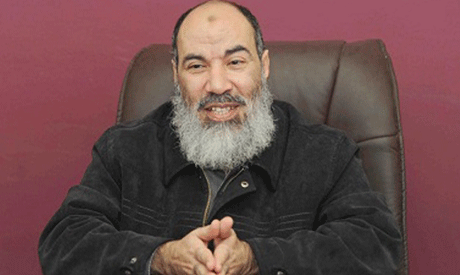
Nageh Ibrahim, the ideologue of the Gamaa al-Islamiya (Photo: Nageh Ibrahim’s Facebook page)
Nageh Ibrahim, co-founder of hard-line Islamist group Al-Gama'a Al-Islamiya, said religion should not be part of any political disputes between Egypt's rival factions.
In an interview with Saudi Arabian newspaper Al-Yaum on Friday, Ibrahim said the involvement of Sharia in the ongoing political rows is unacceptable in Islamic doctrines.
"Those protesting in Tahrir Square are not infidels and are not against the Sharia. Mosques should be spared any political role and involvement in any hypocrisy towards the regime," he added in an implicit criticism of some hard-line Islamist preachers who have made these accusations against anti-Mohamed Morsi protesters.
Tens of thousands poured into the streets to protest the highly-controversial 22 November decree issued by president Morsi to expand his powers. Clashes against Islamists ensued in front of the presidential palace in Cairo, leaving at least eight dead.
Ibrahim, an influential figure in Al-Gama'a Al-Islamiya, was convicted of taking part in a massacre in the Upper Egypt City of Assiut in 1981, which left more than 100 people dead, including many policemen, few days after the assassination of President Anwar El-Sadat.
He spent around 24 years in prison before being released in 2005. He has since sounded a moderate tone.
'Country split'
Ibrahim, who had previously voiced his support of Morsi's decree on grounds that the president had no other choice but to issue it, told the Saudi newspaper that the constitutional declaration has, however, "split the country into two".
"The country's spirit is torn; such division is one of the factors that eventually leads to a geographical division, I'm afraid," he added.
Protesters and opposition forces have expressed their concern over the articles pertaining to Islamic Sharia law in the constitution, approved by a 64 per cent of Egyptian voters in a national referendum earlier this month.
"The problem is that those who call for the application of Sharia do not listen to those who disagree with them, including president Morsi, who has repeatedly promised to apply the Sharia. Their discourse turns people away, which is detrimental to the Sharia project," he said.
"Those who should adopt the cause of applying Sharia should only be senior scholars and preachers and legal jurists."
Implementation of Islamic Law in Egypt's constitution has been a primary objective of several Islamist parties and groups in the wake of last year's Tahrir Square uprising. It was one of the main causes of controversy in the Islamist-led constituent assembly, which saw many walkouts from liberals and secular-minded members.
"Islamic rule does not have a definite structure, which should not even matter as long as we uphold the main features of Islamic rule: justice, equality, preserving general freedoms and freedom of thought, as well as consultation. Achieving these features means we have an Islamic rule," Ibrahim explained.
"The main challenge of Islamists rising to power is to move from the group to the state. In the group they can expel their opponents, but in the state they cannot. Islamists should present a good model of dialogue with all factions of the country and to give up condescension and intolerance."
Al-Gama'a Al-Islamiya's Building and Development party has played an active role in ensuring a firm presence of Sharia in the constitution, as it was one of the main organizers of pro-Sharia mass protests in Tahrir Square in November.
Short link: